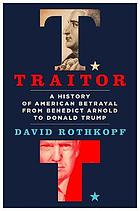
Traitor
A History of American Betrayal from Benedict Arnold to Donald Trump
کتاب های مرتبط
- اطلاعات
- نقد و بررسی
- دیدگاه کاربران
نقد و بررسی

August 17, 2020
In this scathing history, Deep State Radio host Rothkopf (The Great Questions of Tomorrow) contends that Donald Trump belongs “among the many Americans in our history who have, for money or ambition, misjudgment or spite, turned their backs on our flag and people.” Rothkopf’s history of American betrayal includes such well-known figures as Revolutionary War turncoat Benedict Arnold and Soviet spy Julius Rosenberg, as well as more obscure traitors such as James Wilkinson, a U.S. military officer and diplomat who sold secrets to Spain in the late 18th and early 19th centuries. Rothkopf reveals that disputes over deep state cabals and “fake news” have been part of American politics since the country’s founding, and laments that this history has not motivated lawmakers and voters to be more vigilant against threats to democracy. His indictment of the Trump administration largely relies on information already in the public record, including the Mueller Report and congressional testimony on the withholding of military aid from Ukraine. Trump’s violations may not yield any immediate legal consequences, Rothkopf writes, but the verdict of history will deem him a traitor. Though unlikely to change minds, Rothkopf’s well-informed study draws interesting parallels between the past and the present. Liberals will have their worst suspicions about the Trump presidency confirmed.

August 15, 2020
Rothkopf ranges across American history for confirming examples that hold Donald Trump guilty of treason. In his new book, On Treason, Carlton F.W. Larson, a California law professor, discusses how the crime of treason is bound up in such specific technicalities that it is almost never prosecuted as such. Rothkopf takes a less confining view here, holding that Trump "has repeatedly, indisputably, and egregiously betrayed his country." He has done this through many acts of commission, though the author hits hardest on the Mueller Report's assertions of actions that favored other countries--especially Russia--over the one Trump ostensibly leads. A president who is a traitor is a highly unusual situation. But as Rothkopf observes, there have been many other Americans who, motivated by money or ideology, have aided the nation's enemies. The most notorious of them is Benedict Arnold, whose very name is a byword for treason and who attempted to trade away military secrets that might have led to the failure of the American revolutionary cause. Aaron Burr appealed to the British for help in trying to realize his ambitions to power, though they were lukewarm to the idea, and, writes the author, "there is no evidence they sought to break up the United States." John Brown was executed for treason against the state of Virginia, though the charge would not be entertained today. And so forth, on down to the Rosenbergs--who, unfortunately for them, fell afoul of Roy Cohn, later to become Trump's mentor and "often cited as precisely the kind of lawyer Trump was looking for when he appointed William Barr to be U.S. attorney general, a position Trump saw as primarily existing to protect him from his accusers." There are many questions that lawyers need to ask Trump that concern his disdain for American institutions and fondness for foreign dictators, but Rothkopf's conclusions are open-ended. The argument doesn't cinch the charge, but the book makes for a useful summation of ceaseless and blatant malfeasance.
COPYRIGHT(2020) Kirkus Reviews, ALL RIGHTS RESERVED.

























دیدگاه کاربران